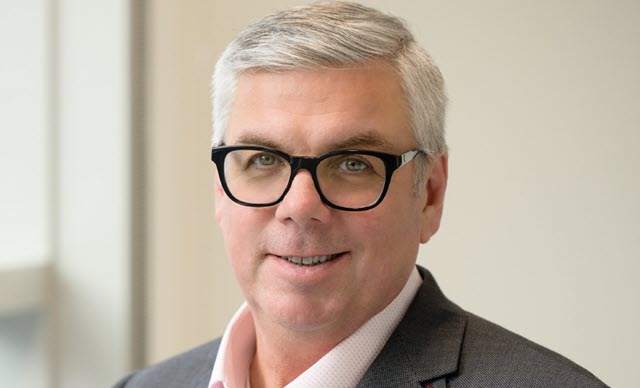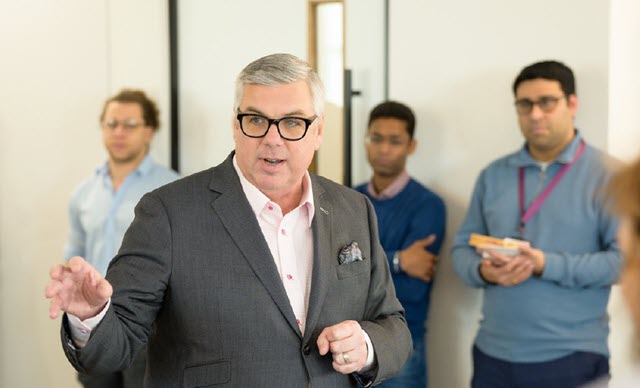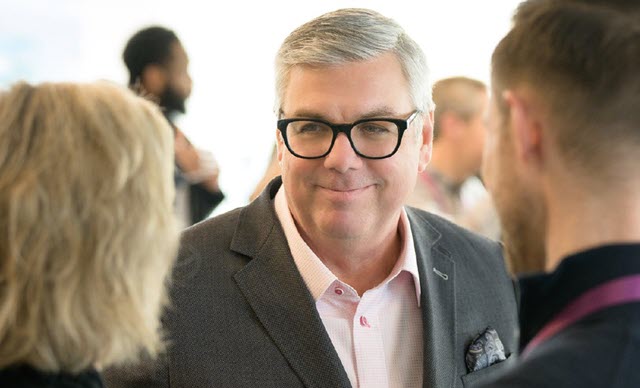- feature
- LEADERSHIP
Association’s new CEO: ‘I want to hear from members’
Calling member feedback “really important,” Mark Koziel aims to build community within the AICPA and CIMA membership bodies.

Related
Profession Ready Initiative targets gaps in early-career CPA readiness
Teen CPA: Caleb Byers earns his license before age 20
Accountability the ‘No. 1 thing’ and other reflections from Bill Reeb
Mark Koziel, CPA, CGMA, is no stranger to AICPA & CIMA, and now that he’s back as CEO, he has a message for their 500,000-plus members:
Don’t be a stranger.
Shortly after officially taking over as CEO of the Association of International Certified Professional Accountants and president and CEO of the AICPA in January, Koziel participated in a wide-ranging interview. During that conversation, he invited members to send emails to AskMark@aicpa-cima.com and “tell me how the Association can help you, your career, and the profession.”
“I want to hear from members,” Koziel said. “Listening to our members, hearing where we can help as the Association, [is] really important. We’re not always going to have the answers, but having those questions upfront can give us some additional strategic direction.”
Koziel’s request for member feedback is part of a listening tour that will help drive and develop his agenda as he looks to build upon what Barry Melancon, CPA, CGMA, accomplished during his more than 29 years as CEO. Koziel worked with Melancon for 14 of those years, establishing himself as one of the most prominent AICPA voices in public accounting, while also being involved in other projects, including the early development of the Dynamic Audit Solution (DAS) and the creation of the Center for Plain English Accounting (CPEA).
Koziel left AICPA & CIMA in 2020 to become president and CEO of Allinial Global, a global association of independent accounting firms based outside Atlanta. During his five years at the helm, Allinial grew from about 250 firms to nearly 270 firms in 109 countries, representing $6 billion in total revenues.
Koziel understands that the accounting profession faces numerous challenges, and he wants AICPA & CIMA members to know that his 30 years of experience in accounting have prepared him for his new role. In addition to his stints at AICPA & CIMA and Allinial, Koziel spent 12 years in public accounting in his hometown of Buffalo, N.Y., working first as an auditor before doing some advisory work. He then joined a client specializing in political media and public affairs. Instead of working as a controller, Koziel ran the 12-person shop’s division that bought TV and radio time for political campaigns and was also client lead in public affairs.
“When thinking about my journey to get me here today to run the largest member body in the world [for accountants], both AICPA and CIMA together, the stars aligned,” Koziel said. “I’ve had experience in public accounting. I’ve had experience in B&I. I have experience in politics and public affairs, which is absolutely necessary for this role. I feel, first of all, humbled and incredibly lucky to represent this great profession of ours, but I feel like I’m ready for the role.”

Following are highlights from the JofA’s interview with Koziel, which were edited for length and clarity. Listen to both parts of the conversation on the JofA podcast.
What would you say is the state of the accounting profession today? What are its strengths, weaknesses, opportunities, threats?
Koziel: The strengths are definitely in the members that we have. I’ve been incredibly fortunate to meet so many in my journeys. Whether we’re talking about CPAs in public practice in the U.S. or CGMAs around the world, our members are doing some incredible things for businesses.
The threats, I think, are the pipeline aspects that are talked about a lot. I’ve heard it first from the U.S. side and from the firms that I’ve been dealing with, but then as I joined Allinial Global and spent the last five years with firms around the world, I figured out very quickly that it isn’t just a U.S. problem. It is [also] a U.K. problem, it is a Germany problem, it is a Hong Kong problem, it is an Australian problem.
Some good pipeline things have happened in the U.S., but I do think having a global perspective and what we need to do as a profession globally to try and increase those numbers is incredibly important.
Many people say artificial intelligence is a threat, that it’s going to put us out of business. I’ve heard that time and again. Excel was going to be the death of the accountant, and blockchain was going to be the death of the accountant, and we’re still here. We’re prospering more than ever. I also see AI as an opportunity to do things differently and interact with our clients differently because they also have the challenges with AI and how to implement it and what it means and providing some level of assurance over AI that gets implemented.
Do you see the profession differently after being the head of Allinial Global?
Koziel: I don’t know if it’s changed as much as it’s been enhanced. We need to interact with our members differently and allow our members to interact with each other.
When I got to Allinial, I said, “I want to make sure that we’re managing our firm relationships in a different way. How do we relate to our members? What is the interaction? What’s the communication vehicle that we use to do that?” They said, “Well, we use our website.” I had just dealt with that for 14 years at the AICPA, and it’s not a personal relationship in any way, shape, or form.
You can’t rely on a website. You can’t rely on LinkedIn to be your communication vehicle and your community. Creating community is going to be a focal point of mine, and it comes out of what we did at Allinial. We created communities around audit, audit U.S., audit global, tax, transfer pricing.
I’d love to bring that into the Association.
How do you create those communities? How did you do that at Allinial? How do you see it possibly working differently for the Association?
Koziel: Like anything in life, there’s an app for that. There are a lot of great community-related platforms out there where you could have an area for members to interact with each other, but also a resource section that puts things at their fingertips.
Upon your appointment as CEO you said, “The profession is well positioned to expand and to continue to evolve.” Tell me more about that evolution, that expansion, what you mean by that.
Koziel: I think first and foremost, who’s going to provide some level of assurance over AI? We are in the assurance business. We have done assurance over financial information for 100-plus years. We got into assurance over controls, and the SOC [System and Organization Controls] reporting that we now have, and then assurance over cyber, which we have an even greater opportunity to expand.
Also, at Allinial we would talk about outsourcing. The minute I’d say outsourcing, some people would immediately have in their brain that I said offshoring. I didn’t. I said outsourcing.
Now outsourcing can include offshoring, but is outsourcing a threat to the profession? I think it’s helped firms grow and continue to grow and tackle challenges we’ve seen in the profession of those in public accounting and in business and industry trying to find people. This whole outsourcing concept, it helps firms grow and be able to fill capacity.
And firms in the U.S. doing client accounting services (CAS) are asking for more upskilling support. Well, the upskilling support is actually the CGMA content that we can roll into what is happening in CAS.
Then when you look at the CGMA globally, more firms are out there that aren’t necessarily AICPA member firms because they’re in a [public accounting] member body in their particular country, the CGMA is going to be a great alignment for them to be able to differentiate themselves in the marketplace from other folks.
That expansion, I think, is going to be incredibly opportunistic, and it’s not going to go away anytime soon.
What is your view of some of the talent pipeline challenges out there? What are the solutions that you think can turn things around?
Koziel: I’ve studied the National Pipeline Advisory Group’s analysis and recommendations, and I think they’re pretty spot on. I don’t want to get into the politics of the 150-hour rule. Does it contribute to our pipeline challenges? Maybe, but not by itself. Thinking that changing the education requirements is going to solve the pipeline challenge, I think, is just not completely accurate.
There are plenty of other things to do. First of all, we have to tell a better story. Accounting is actually pretty darn good, if you think about it. It’s pretty prosperous. Do you work hard? Yeah, you absolutely work hard. But you know what? We don’t own hard work as a profession.
We’ve got to work on starting salaries. We lag behind some other majors in the business community, for sure.
Imagine I was coming out of school or still in school and considering what business career I wanted to go into, but I was concerned about work/life balance and earnings and earning potential. What would you say to someone like me who is considering accounting, but also considering other options?
Koziel: Whether you take business and industry as your channel or public accounting, I think the opportunities are endless.
I tell U.S. students to get the CPA. It’s the one thing they can never take away from you, you will always have some level of work to do. I think we can say the same of CGMA as we continue to build that. The FLP [Finance Leadership Program], what we’re hearing from the Future of Finance and what CFOs are looking for, there are a lot of opportunities out there. It’s a good living.
As far as work/life balance, I never liked the word “balance,” because I think you’re setting yourself up for failure to think that you’ll ever have balance in any way. But there’s work/life integration, there’s work/life management.
I remember being at my firm when my son was born, and my son was born a preemie, so he was in the neonatal intensive care unit. My wife’s at one hospital, my son’s at another hospital, and I got to go get her and then bring her back. The managing partner of my firm, I told him about it. He said, “Whatever you need, take it.” The flexibility of public accounting actually is pretty extreme. I don’t know if I would have gotten that in all organizations, and so that became really important.

The balance isn’t just between the individual and the employer, the balance is with family, and it’s having the courage to say when you need help. I think there’s a lot of help that’s available out there, and there’s a lot of ways to be incredibly flexible. All the firms that have gone hybrid now, I think that’s helpful. Some firms are fighting that a little bit, but I think if you talk to the next generation, some level of hybrid has been better for that. But it’s a pretty darn flexible profession, and I think we need to take advantage of that. We need to market that more.
What did the experience of working for the grocery store Wegmans teach you?
Koziel: My first job there was pushing carts, bringing carts in from the parking lot. Let me tell you about hard work. Try and push 15 carts through slushy snow in Buffalo. They now have power carts to make that happen. We had to do that by hand back in the day. At 16, I was evaluated every other month by the front-end manager on how well I did in pushing carts and, more importantly, how I was servicing customers.
Every person in that organization got a similar type of evaluation. If it was important enough for them to give me feedback on my performance, shouldn’t we expect that out of all professional-service firms and professional organizations? We owe it to those that are working for us to make that happen. To first give them education on what the competencies are and then provide feedback against that on a periodic basis becomes important.
How does the accounting profession best adapt and work with, as opposed to fight, generative AI and other transformative technologies? Also, how can that explosion of technology help in the pipeline issue?
Koziel: I spoke at the Digital CPA Conference a couple years ago. I had two of our CEOs from Allinial member firms on stage, and we talked about outsourcing and how they were able to grow their firms exponentially, even though there was a talent crunch. If there’s a new process that needs to be created, or there’s a key person who’s leaving, the way they look at it today is they say, “Can we automate it 100%? Yes or no? Yes, then great, go automate it. If no, can we automate a portion of it and can we outsource a portion of it? If we can’t do that, can we outsource all of it? If we can’t do that, now we need to make the hiring decision.” The hiring decision is actually last in the hierarchy rather than the first.
So many firms are immediately saying we need to replace the body with a body. That’s not always the case. People say, “Well, that’s a threat to our existence because we’re eliminating jobs for accountants,” but that’s actually not true. We have them doing different things. At that entry level, I think, is where part of the crunch has been on the profession. At that entry level, if you think back to what I did, when I entered into public accounting back 30 years ago, making copies of accounts receivable confirmations at the copier may not have been the highest, best use of my time, but that’s what I did as a staff accountant. That’s been eliminated.
When you think about the requirements on new entrants into firms, into companies doing financial analysis, they’re being asked to do higher-level work immediately rather than what was asked back 30 years ago. We haven’t eliminated what makes us talented as accountants. We’ve eliminated some of the mundane and routine tasks that people didn’t necessarily want to do.
I think auditors need to be upskilled faster — our training level of how we’re going to train people needs to change. You need to bring talent to the table, train them, … get them virtual reality—type engagements that they can work on, test them on. When you go out into the field, you are ready to be almost like that light senior of the past rather than a staff accountant. The requirements have changed.
About the authors
Jeff Drew is the JofA’s editor-in-chief. Neil Amato is the JofA’s senior manager of news and also host of the JofA podcast. To comment on this article or to suggest an idea for another article, contact Jeff Drew at Jeff.Drew@aicpa-cima.com.
LEARNING RESOURCES
AICPA President and CEO Mark Koziel, CPA, CGMA, will be on the agenda at the biggest event in the accounting profession, AICPA & CIMA ENGAGE 25, to be held at the ARIA in Las Vegas. Don’t miss it!
June 9–12
CONFERENCE
The Private Companies Practice Section (PCPS) is an add-on firm membership section within the AICPA that supports CPA firms of all sizes in the everyday intricacies of running a practice by providing practical and customizable practice management resources. For more information, click on the PCPS membership headline above.
SECTION
For more information or to make a purchase, go to aicpa-cima.com/cpe-learning or call 888-777-7077.
AICPA & CIMA MEMBER RESOURCES
Articles
“Koziel to Become AICPA President and CEO,” JofA, Dec. 1, 2024
“Melancon Leaves AICPA With a Legacy of Change,” JofA, Dec. 1, 2024


















